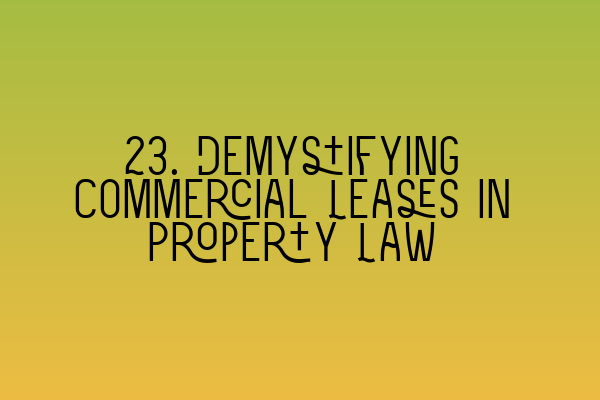Demystifying Commercial Leases in Property Law
In the realm of property law, commercial leases play a crucial role in facilitating business transactions. Whether you are a landlord or a tenant, understanding the intricacies of commercial leases is essential to protect your interests and ensure a smooth business operation. In this article, we will demystify commercial leases in property law, providing you with the necessary knowledge to navigate these complex legal agreements.
1. Understanding Commercial Leases
A commercial lease is a legally binding agreement between a landlord and a tenant, granting the tenant the right to use a property for business purposes. Unlike residential leases, commercial leases often involve more complex negotiations and provisions to account for the unique requirements of commercial activities.
Commercial leases can vary in terms of duration, rent structure, and the responsibilities of both parties. It is crucial to carefully review and negotiate the terms of a commercial lease to ensure they align with your business objectives.
2. Key Provisions in Commercial Leases
Commercial leases typically contain several key provisions that address the rights and responsibilities of both the landlord and the tenant. Let’s explore some of the essential provisions that you should pay attention to:
a. Rent and Rent Review
The rent provision outlines the amount of rent to be paid, the frequency of payments, and any rent review mechanisms. It is essential to understand how and when the rent can be increased to ensure it aligns with market rates and your financial capabilities.
b. Term and Renewal
The term provision specifies the duration of the lease, which can range from a few months to several years. Additionally, it may include provisions for renewal or termination, providing clarity on the options available to both parties at the end of the lease term.
c. Repairs and Maintenance
The repairs and maintenance clause outlines the responsibilities for maintaining the property in good condition. It is crucial to clarify the extent of maintenance obligations, particularly when it comes to structural repairs and common areas.
d. Use and Alterations
The use provision defines the permitted use of the property, ensuring that it aligns with your business activities. It may also include provisions regarding any alterations or improvements that the tenant wishes to make to the premises.
e. Insurance and Indemnity
The insurance and indemnity clause outlines the insurance requirements for the property, including who is responsible for obtaining insurance coverage. Additionally, it specifies the obligation to indemnify the landlord against any claims arising from the tenant’s use of the property.
3. Negotiating and Drafting a Commercial Lease
When entering into a commercial lease agreement, it is essential to negotiate and draft the terms carefully to protect your interests. Here are some steps to consider:
a. Seek Legal Advice
Consulting with a property law solicitor is critical to ensure you fully understand the legal implications of the lease agreement. They can provide valuable guidance and assist you in negotiating favorable terms.
b. Conduct Due Diligence
Conduct thorough due diligence on the property, including its condition, compliance with regulations, and any potential environmental issues. This assessment will help you make informed decisions and negotiate appropriate warranties and indemnities.
c. Clearly Define Terms
Clearly define the terms of the lease, such as rent, lease term, renewal options, and any specific provisions that are important to your business. Clarity is paramount to avoid misunderstandings and disputes in the future.
d. Consider Professional Help
You may also need to seek assistance from building surveyors, architects, or other professionals to ensure the property meets your business requirements. Their expertise can help identify any potential obstacles or modifications needed before finalizing the lease.
4. Conclusion
Commercial leases in property law are multifaceted agreements that require careful consideration and negotiation. By understanding the key provisions, seeking legal advice, and conducting due diligence, you can ensure that your commercial lease protects your interests and facilitates a thriving business operation.
If you have any questions or require assistance with commercial leases, our expert team at SQE Property Law & Land Law is here to help. Contact us today to schedule a consultation.
For additional resources on property law and preparing for the SQE exams, please check out the following articles:
